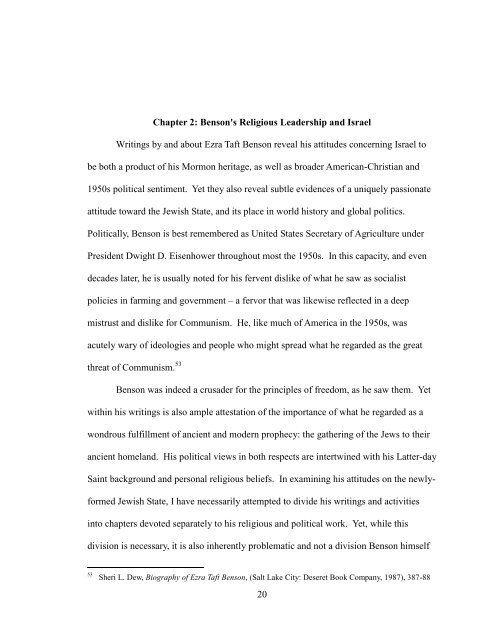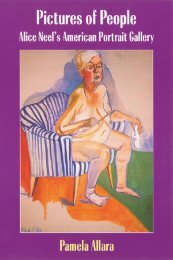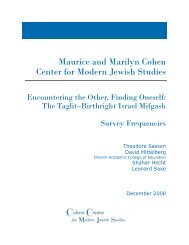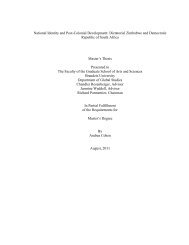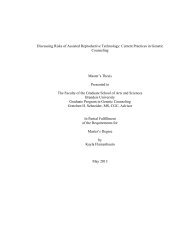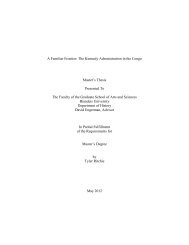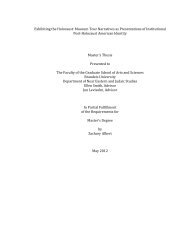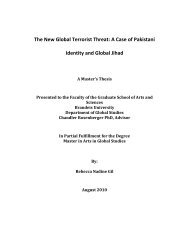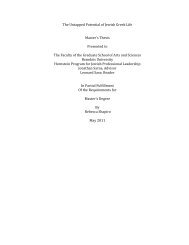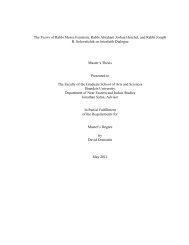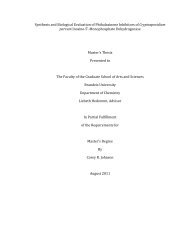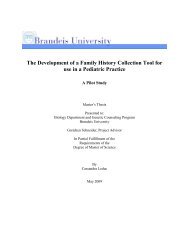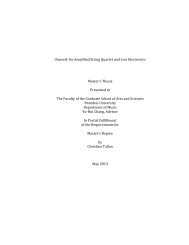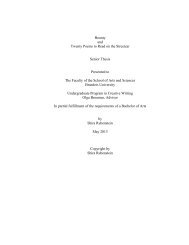Ezra Taft Benson and the State of Israel - Brandeis Institutional ...
Ezra Taft Benson and the State of Israel - Brandeis Institutional ...
Ezra Taft Benson and the State of Israel - Brandeis Institutional ...
- No tags were found...
Create successful ePaper yourself
Turn your PDF publications into a flip-book with our unique Google optimized e-Paper software.
Chapter 2: <strong>Benson</strong>'s Religious Leadership <strong>and</strong> <strong>Israel</strong>Writings by <strong>and</strong> about <strong>Ezra</strong> <strong>Taft</strong> <strong>Benson</strong> reveal his attitudes concerning <strong>Israel</strong> tobe both a product <strong>of</strong> his Mormon heritage, as well as broader American-Christian <strong>and</strong>1950s political sentiment. Yet <strong>the</strong>y also reveal subtle evidences <strong>of</strong> a uniquely passionateattitude toward <strong>the</strong> Jewish <strong>State</strong>, <strong>and</strong> its place in world history <strong>and</strong> global politics.Politically, <strong>Benson</strong> is best remembered as United <strong>State</strong>s Secretary <strong>of</strong> Agriculture underPresident Dwight D. Eisenhower throughout most <strong>the</strong> 1950s. In this capacity, <strong>and</strong> evendecades later, he is usually noted for his fervent dislike <strong>of</strong> what he saw as socialistpolicies in farming <strong>and</strong> government – a fervor that was likewise reflected in a deepmistrust <strong>and</strong> dislike for Communism. He, like much <strong>of</strong> America in <strong>the</strong> 1950s, wasacutely wary <strong>of</strong> ideologies <strong>and</strong> people who might spread what he regarded as <strong>the</strong> greatthreat <strong>of</strong> Communism. 53<strong>Benson</strong> was indeed a crusader for <strong>the</strong> principles <strong>of</strong> freedom, as he saw <strong>the</strong>m. Yetwithin his writings is also ample attestation <strong>of</strong> <strong>the</strong> importance <strong>of</strong> what he regarded as awondrous fulfillment <strong>of</strong> ancient <strong>and</strong> modern prophecy: <strong>the</strong> ga<strong>the</strong>ring <strong>of</strong> <strong>the</strong> Jews to <strong>the</strong>irancient homel<strong>and</strong>. His political views in both respects are intertwined with his Latter-daySaint background <strong>and</strong> personal religious beliefs. In examining his attitudes on <strong>the</strong> newlyformedJewish <strong>State</strong>, I have necessarily attempted to divide his writings <strong>and</strong> activitiesinto chapters devoted separately to his religious <strong>and</strong> political work. Yet, while thisdivision is necessary, it is also inherently problematic <strong>and</strong> not a division <strong>Benson</strong> himself53Sheri L. Dew, Biography <strong>of</strong> <strong>Ezra</strong> <strong>Taft</strong> <strong>Benson</strong>, (Salt Lake City: Deseret Book Company, 1987), 387-8820


